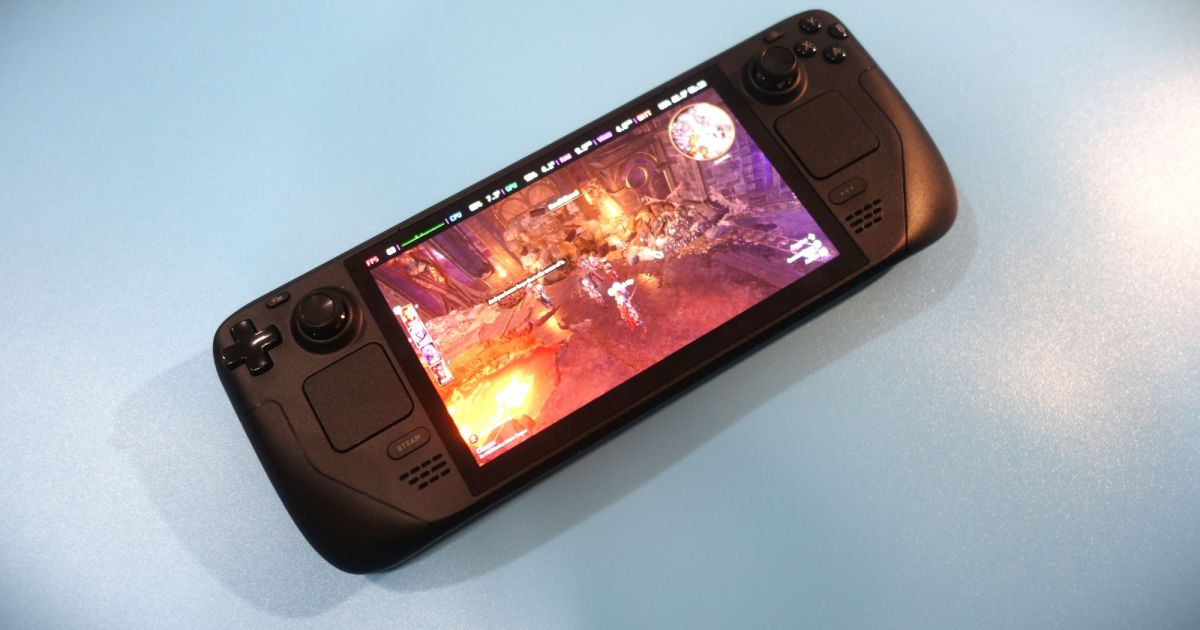Steam Deck OLED review: Valve’s refreshed handheld made me a believer
The Steam Deck OLED upgrade fixes just about every glaring problem Valve's experimental first draft had.


Steam Deck OLED
MSRP $550.00
Pros
Same great portable PC Significantly improved display Better battery Cooler, quieter fans Faster download speedsCons
Linux still presents hurdlesOK, consider me a convert.
Ever since the Steam Deck was an implausible rumor, I’ve viewed Valve’s experimental handheld with a lot of skepticism. The idea of a device that played my PC games on the go sounded incredible on paper, but I was left wondering if the idea could deliver on those aspirations. When the device finally dropped in February 2022, a lot of my concerns were initially justified. A massive form factor, poor battery, and inconsistent game compatibility made the device feel like a rough draft of a great idea. And yet, I slowly found that I couldn’t imagine traveling without it with each passing day.
Perhaps sensing that the device was right on the cusp of greatness, Valve dropped a major surprise last week when it revealed the new Steam Deck OLED. It’s not an entirely new console — the design is almost exactly the same — but it’s the small refresh the Steam Deck needed to keep it ahead of a growing list of competitors. With a significantly improved screen, better battery, and small tweaks that go a long way, the Steam Deck’s second draft makes it clear that Valve’s portable PC is still the king of the hill.
Design and display
In terms of form factor, virtually nothing has changed with the new Steam Deck model. It’s the same top-heavy design that looks and feels enormous on first impression, but becomes more natural after a while. Thankfully, it actually is a touch lighter, shaving off around 30 grams. It’s a small change, but I can definitely feel the difference – especially coming off using a hulking device like the Legion Go. Otherwise, the only change is that it has a red power button now and a green power light. If you need a refresher on some of its basics, refer back to my original review of the 2022 model (see link above), which has since been updated to reflect the software and game compatibility improvements made over the past two years.
The bright new OLED screen solves my biggest problem with the Steam Deck
The main difference — and it’s a major one — is the display. The new screen is about .4 inches larger than that of the base Steam Deck, expanding into the bezel without changing the size of the system. It’s not as noticeable an increase as on the Nintendo Switch OLED, but I’ll never complain about getting a little more space on a portable screen.
More importantly, the device now uses an OLED display instead of the original model’s washed-out LCD screen. That’s a significant upgrade that was necessary to keep the system competitive. Rivals like the Ayaneo 2S and Legion Go used that original weakness to pounce on Valve with crystal clear displays that made the Steam Deck feel cheap by comparison. I was ready to pack up my old Steam Deck when I got my Legion Go earlier this month, but the bright new OLED screen solves my biggest problem with the device.
 Steam Deck LCD (top) and Steam Deck OLED Giovanni Colantonio / Digital Trends
Steam Deck LCD (top) and Steam Deck OLED Giovanni Colantonio / Digital TrendsYou might not notice the difference at a passing glance, but it becomes very apparent when placing the old and new screens side by side. My base Steam Deck almost looks like it has a white veil draped on top of it, softening its visuals. That veil is entirely lifted with the new model, allowing games to display with much sharper contrast and brighter colors. The colorful world of Baldur’s Gate 3 comes to life here, while Diablo 4 gets to show off its deep darkness in pitch black caves.
That screen also comes with a much welcome refresh rate boost. It’s a 90Hz display, allowing games to easily push past the 60 frames-per-second (fps) bar when possible. I was able to reach those heights in smaller indies like The Wreck, showing that the machine is perfectly capable of delivering. For dedicated Steam Deck owners who use theirs religiously, that upgrade alone makes it worth it.
Power and battery tweaks
Casual Steam Deck owners might not notice some of the device’s smaller changes, but they add up to make the refresh worthwhile. For one, the OLED model features a slightly tweaked AMD chip with a 6-nanometer process node compared to the base model’s 7. The layman’s version of that spec is that the chip isn’t more powerful, but rather more efficient in how it uses its power. You might only get a few extra frames out of any given game, but that helps make sure that those that struggled to hit the 60 fps mark consistently now have a better shot at stability.
 Jacob Roach / Digital Trends
Jacob Roach / Digital TrendsTake Horizon Zero Dawn, for instance. While it tops out at 56 fps on the LCD model, it now hits a stable 60 fps on the OLED. The more drastic result in our tests came from Dying Light 2: Stay Human, which saw a full six frame performance increase. Smaller games that push past the 60 fps mark see noticeable improvements too. Strange Brigade jumps from 79 fps to 84 fps, which is a change you’ll actually be able to take advantage of on the OLED’s 90Hz display.
 Image used with permission by copyright holder
Image used with permission by copyright holderThese results aren’t a massive change, but they do put the Steam Deck more in line with rivals like the Asus ROG Ally. The Ally still squeezes out a few more frames in games like Returnal, but the Steam Deck OLED only lagged by three to five frames in our tests. Horizon Zero Dawn, on the other hand, now performs just the same on the OLED as it does on the Ally. With the Steam Deck’s refreshed pricing model, the extra power is no longer a checkmate for pricier alternatives.
Another big change comes in the system’s battery tweaks. Poor battery was one of the Steam Deck’s biggest issues at launch, with new games like Elden Ring struggling to last an hour without some significant tweaking. Valve has done a fantastic job since day one to squeeze more juice out of the battery with software updates, but the OLED model is a more drastic hardware update.
Those who mostly use the system to play 2D games like Dead Cells will see the most returns.
A 30-minute session with Vampire Survivors running at 90 fps consumed only a little more than 5% of my battery. I can get between six and seven hours in that game, which is long enough to last an entire cross-country flight. The more expansive the game, the less you’ll notice the change. The Wreck, a 3D narrative indie, drains the battery in closer to four hours while Diablo 4 kills it in around two. Granted, this is all just using out of the box settings, so there’s plenty of room to squeeze way more out of games. Those who mostly use the system to play 2D games like Dead Cells will see the most returns.
All of these changes go hand in hand with the OLED model’s improved thermals, which lead to a few additional improvements that those who use their Steam Deck every day will notice. It doesn’t get as hot, the fan is significantly quieter, and it doesn’t smell as bad. Yes, I sniffed fumes out of both systems’ top vents to test this and can confirm that the OLED does not smell like burning plastic. A weird test, but it sure beats licking Switch cartridges.
Other extras
There are a few other extras packed in, though they’re more built for specific players. Those who like tinkering with their system will notice that it’s easier to open, but slightly harder to tool around with due to one surprising ribbon cable change. I imagine 99% of Steam Deck owners will never notice that; that’s something for techies like us to obsess over. More useful is the fact that the system now supports Wi-Fi 6E. If you’re able to take advantage of that, you’ll enjoy some significantly improved download speeds. It took me less than an hour to download the enormous Baldur’s Gate 3, while Senior Computing Staff Writer Jacob Roach installed 45 games on his in eight hours.
 Giovanni Colantonio / Digital Trends
Giovanni Colantonio / Digital TrendsAs an added bonus, the limited edition OLED model comes with a redesigned carrying case that includes a Velcro strap on top of the outside zipper. That’s great for people like me who often toss it into the case and drop it in my messenger bag unzipped in a hurry. The Velcro strap gives me a much quicker way to secure it in those moments, though I wouldn’t line up for a preorder just for that feature alone. The inside padding in the case can also be removed entirely to make it smaller, which gives it some welcome flexibility.
There’s one change here that’s perhaps more crucial than anything I’ve mentioned so far: It’s cheaper than the old version. While the LCD model still has the lowest barrier to entry with its $400 256GB variant, the OLED edition gives the handheld a price cut. The 512GB edition is $550, while the 1TB version costs $650. Previously, you were paying $650 for the 512GB LCD model, so that’s a $100 price drop. And if you want more storage, you can double it for the same price as the old high-end version. Considering that more powerful rivals like the Asus ROG Ally weren’t too far off from the Steam Deck’s old high-end model, the new price structure is crucial in making sure the Steam Deck is still the best balance of price, storage, and power.
The Steam Deck OLED is finally the PC gaming companion I always hoped it would be one day.
The ultimate question is more of an existential one: Does it really make sense to buy a Steam Deck right now? We’ve already seen competition heat up fast in the portable PC space, with devices like the Ayaneo 2S quickly outpacing Valve in power and performance. Considering that new big-budget games are only getting more demanding, it’s only going to get harder to run new releases like Alan Wake 2 on the machine with each passing year. Even if Valve isn’t immediately plotting a Steam Deck 2 for next year, I have to imagine one isn’t too far behind. I wouldn’t blame you for waiting.
That said, this feels like the exact right moment to hop in. With crucial changes to display and battery, the OLED model fixes the launch edition’s two most pressing issues. Your comfort will vary and its complicated Linux browser isn’t for everyone, but try using a Windows device like the Legion Go if you think the grass is greener on the other side. Even without top-of-the-line power, the Steam Deck perseveres because it’s still the most convenient handheld PC on the market. It has never been easier to load up a Steam game on the go and doing so looks even better now.
After years of skepticism, the Steam Deck OLED is finally the PC gaming companion I always hoped it would be one day. And it took less than two years to get there.

 JaneWalter
JaneWalter 
































